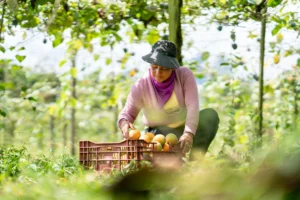This post was written by FLPC staff.
Across the United States, individuals are being told to implement social distancing protocols to slow the spread of novel coronavirus (COVID-19). Cities and states are issuing shelter in place orders to keep individuals in their homes. Recognizing that food is essential, these orders generally allow for individuals to leave their homes to gather food and other household supplies. However, seniors, individuals with compromised immune systems, and individuals experiencing symptoms of COVID-19 are being advised to stay at home. These individuals need access to food delivery. Further, areas hardest hit by COVID-19 have a vested interest in making it easy for people to stay at home and avoid crowded grocery stores.
Many restaurants and grocery stores are still engaging in home delivery. While purchasing these products does not pose a problem for those with stable incomes, vulnerable individuals and families are in need of free or low-cost home food deliveries.
The Food Law and Policy Clinic today released an issue brief detailing opportunities in non-crisis food assistance programs, disaster programs, and food donation programs through which the federal government and state governments could facilitate food delivery during the COVID-19 pandemic. The brief analyzes places where modifications are needed to allow food delivery, where existing programs could be bolstered, and where there are opportunities for new programs. Recommendations include:
Supplemental Nutrition Assistance Program (SNAP)
- Roll out national online purchasing option as quickly as possible (USDA)
- Remove the SNAP restriction on payment prior to delivery (Congress)
- Pay for delivery fees, to ensure SNAP recipients have equal spending power whether ordering online or going to stores (USDA or state governments)
Supplemental Nutrition Assistance program for Women, Infants, and Children (WIC)
- Implement home delivery programs as a food delivery method (state governments)
- Allow for online purchases (Congress)
National School Lunch Program
- Eliminate the 50% free/reduced price recipients threshold for food service in places where schools are closed (Congress)
- Approve school food authorities to home deliver meals (states governments)
Facilitate delivery of foods from food banks and food donations
- Further increase the administrative funds available within The Emergency Food Assistance Program (TEFAP) to support home delivery of TEFAP foods (Congress)
- Provide tax benefits to incentivize volunteer drivers to deliver foods (Congress)
- Offer funds to community based food delivery organizations and food recovery matching technology organizations to pay for vehicles, drivers, and technology expansion (Congress)
Visit our issue brief to learn more about each of these actions. These measures are by no means comprehensive. FLPC remains committed to working with nonprofits, community members, and policymakers to find innovative solutions to ensure free and low cost home delivery of foods to vulnerable individuals and families during this unprecedented crisis, and welcomes feedback on these proposals.


Food Law & Policy, Commentary
Policy to Reduce Methane Emissions and Feed More People
April 3, 2025